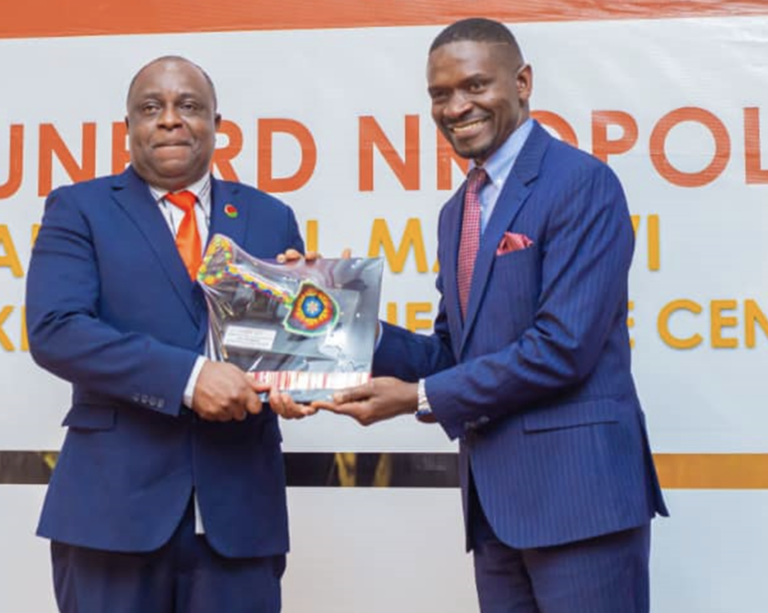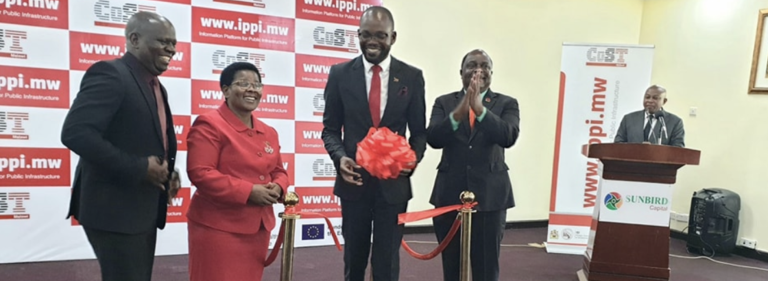Member since 2012

Prior to CoST: public infrastructure in context
Prior to 1994 – when Malawi transitioned from single to multi-party rule – public infrastructure was centrally implemented, with minimal private sector involvement. However, as the country returned to multi-party governance, the government privatised most public infrastructure projects. With this came the rise of private sector players in the construction industry in Malawi. As competition for contracts increased, so did incentives to bribe public officials involved in the procurement process. Corruption became a pervasive issue at all levels of government in the sector, with a notorious “cash gate” cycle that involved various companies.
According to the World Bank’s 2006 Corruption and Governance Baseline Survey for Malawi, corruption was prevalent across all sectors at this time. 70% of all public budgets in Malawi were allocated for procurement, with significant amounts directed to the procurement of public infrastructure. This provided ample opportunity for bribery and corrupt practices to flourish.
Additionally, a baseline survey, which was conducted in 2008, showed a distinct lack of transparency and oversight in the construction sector. The survey also revealed that data publication in public infrastructure was limited to only the contract award stage.
CoST Malawi: how it all began
Malawi joined CoST during the pilot stage in 2008, after the Government of Malawi expressed interest in the principles of the initiative through the Office of the Director of Public Procurement.
By this time, the Government had appreciated that one of the most effective ways of solving complex governance challenges and building legitimacy for change was implementing the CoST multi-stakeholder approach. By bringing together the Government, the Private Sector, and Civil Society representatives in support of transparency, participation, and accountability, this approach promotes the use of data-driven evidence to engage with and influence decision-makers to contribute and act as agents of change against corruption.
Data publication
The data publication process ensures that data about the purpose, scope, costs and execution of infrastructure projects is open and accessible to the public, and that it is data is published in a timely manner.
Before Malawi joined CoST, infrastructure data was published only at the contract award stage of the project cycle. Since joining CoST, data publication has evolved to cover the entire project cycle.
In 2017, the Malawi parliament approved changes to the Public Procurement Act to introduce a legal mandate for publishing data in line with the CoST Infrastructure Data Standard. The legislation, which was brought into effect in 2021, meant that information on public infrastructure would be published at each stage of the project cycle. This interview with CoST Malawi Programme Manager, Lyford Gideon, outlines the process of securing the legal mandate for data publication, which was the culmination of many years of engagement with various government administrations throughout periods of political instability.
The mandate was made possible through lobbying by the CoST Multi-Stakeholder Group, former Vice President of Malawi Peter Mutharika, and CoST Malawi Champion, then the Late Saulos Chilima, who was central in pushing the legislation forward. The legal mandate for data publication would later significantly help create a surge in the amount of data published in Malawi from 2023, allowing citizens to further hold decision makers to account, following innovations on the information platform, and the new Champion, HE. Lazarus Mackarthy Chakwera.
CoST Malawi launches the Information Platform for Public Infrastructure (IPPI)
In 2017, CoST Malawi launched an online data publication portal called the Information Platform for Public Infrastructure (IPPI Malawi). At the time, there was no specific legal mandate or regulation on data publication by procuring entities. This made it very complex to record progress on information sharing in Malawi, until 2022, when CoST Malawi re-designed its information platform that was built using the CoST Infrastructure Data Standard to incorporate the Open Contracting for Infrastructure Data Standard (OC4IDS). The new platform was popularised across Malawi through 47 lobbying and awareness-raising events, and training officials from 53 of the 61 MDAS, who in turn published data on more than 700 projects by August 2024.
The Multi-Stakeholder Group also launched an analytical dashboard, which analyses data in real time, helping stakeholders access insights and evidence on project performance. As entities publish data, analytics produced by CoST Malawi reveal specific issues and improvements with entities’ compliance in data publication, standing at 62%. The President’s office takes a keen interest in ensuring entities publish data and requires briefs to the President from time to time, on the performance of entities on the platform. Although the information publication process in Malawi appears promising, there are critical areas that the government needs to address. These vital steps include compliance monitoring of entities to implement data publication requirements, training on information publication, harmonization of roles and responsibilities, and awareness raising on the value of transparency
Independent review
We promote accountability through the CoST independent review (assurance) process – an independent review of the published data by assurance teams based within CoST memberships.
CoST Malawi has produced five independent review reports, which have largely identified similar challenges in contract management, particularly relating to time and cost overruns. In June 2020, the Government of Malawi increased funding to support the design and construction of radiation treatment and brachytherapy units at a $10 million USD cancer hospital. This followed a CoST Malawi report that highlighted that the units had not been built, as the lead consultant selected to develop the design and supervise the construction had allocated insufficient budget and lacked the expertise to design them. The additional budget allocated to this specialist facility was anticipated to ensure Malawians can receive treatment within their own country and avoid a potential ‘white elephant’ hospital.
Through the influence of CoST, the Roads Authority established a whistle-blowing programme to enable the public to take an active role in the management of road projects.
Most importantly, CoST Malawi has been able to influence policy and legal changes because of its assurance reports. This includes the inclusion of a Corporate Governance Priority area in the National Construction Industry Policy, as well as the legal requirement for data publication included in the Public Procurement and Disposal of Assets Act.
Multi-Stakeholder Working
CoST brings together stakeholder groups with different perspectives and backgrounds from across government, the private sector, and civil society. Through each member’s Multi-Stakeholder Group, these entities can guide the delivery of CoST and pursue infrastructure transparency and accountability within a neutral forum.

The National Construction Industry Council (NCIC) hosts and convenes the CoST Malawi Multi-Stakeholder Group.
Infrastructure transparency becomes institutionalised when both the political and technical arms of government are in support of the CoST approach. In March 2021, the CoST Malawi Multi-Stakeholder Group (MSG) secured the highest level of political support with the appointment of the President, HE Dr Lazarus Chakwera, as the CoST Champion. President Chakwera described CoST as a “blessing” and would not allow politicisation of CoST activities. He also indicated that during his term of office, “openness of infrastructure projects must be the norm and not an option.” President Chakwera’s role as champion bolstered official support for CoST Malawi’s work.
This commitment gave the MSG the highest level of confidence to deliver a fully-fledged programme. The President issued two directives operationalising the information platform, with requirements for entities to publish infrastructure data.
CoST Malawi has embarked on a process to further strengthen its MSG, with the upcoming departure of the outgoing Chairperson, Joe Chin’gani, who is retiring after serving a well-deserved 16 years, seeing CoST Malawi through all thick and thin moments.

Civic engagement
Social accountability and civic engagement ensures that information on public infrastructure projects is in the public domain. CoST works with stakeholders such as the media and civil society to promote the findings of the assurance process and ensure decision makers are held to account.
CoST Malawi has undertaken several steps to enhance social accountability. In 2016, it launched an innovative text message platform to provide citizens with a real-time reporting mechanism for infrastructure issues affecting their local area. In the first six weeks since its launch, CoST Malawi was inundated with almost 150 texts from local citizens seeking accountability from their public infrastructure decision-makers. CoST Malawi then submitted all information to the relevant authorities, who were provided an opportunity to respond through both radio panel discussions and concrete remedial actions within their institutions. The initiative received an Open Government Partnership Summit 2016 in Paris under the theme of ‘Making Transparency Count’. It has been pivotal in empowering the public, giving them an accessible tool with which to hold decision makers to account.
CoST Malawi has embarked on various training sessions with procuring entities on the CoST approach, which has increased both proactive and reactive publication of project information. In line with the CoST Infrastructure Data Standard (CoST IDS), proactive publication relates to the information CoST requires project owners and procuring entities to publish data at specific stages. In 2023, CoST Malawi trained 94 CSOs, media, and public officials and equipped them with skills on how to innovatively monitor public infrastructure procurement processes using data from project contracts. Some testified having been empowered with advocacy and lobbying skills to question methods of project delivery, while government officials were committed to sustaining the knowledge and skills they retained from the training.
Trained CSOs have reported monitoring projects that have resulted into actions by public officials, including; compelling the Ministry of Youth to reinstate implementation of a stalled national aquatic complex project in Lilongwe worth MK 7.2Billion, the ministry also fixed the identified visible cracks on the walls, Influencing design reviews and refinancing for an indoor Griffin Sayaenda stadium in Lilongwe, Influencing the Roads Authority complies with Environmental, Health and Safety Safeguards at the construction of a new six lane Kenyatta drive in Lilongwe. In addition, a CoST-trained journalist unearthed poor construction works and cracks at the Mzenga secondary school. The story attracted NCIC to investigate the contractor’s workmanship and required the Nkata–Bay Council to rein in the contractor to fix the issues. The entity also improved its publicity and began uploading data on the IPPI, starting with the Martyrs Memorial Centre.
In addition, CoST Malawi organises public meetings where its independent review and monitoring reports are disseminated, develops radio messaging (such as jingles), and hosts media awards. These awards celebrate the work of journalists investigating public infrastructure mismanagement in Malawi. CoST Malawi’s physical public meetings attract approximately 300 people, and over 30,000 people virtually.
CoST Malawi assurance reports
CoST Malawi Assurance Report 2010
Various reports from CoST Malawi’s 2013 assurance process can be found here
CoST Malawi Assurance Report 2016
CoST Malawi Assurance Report 2017
CoST Malawi Assurance Report 2018
CoST Malawi Assurance Report 2019
CoST Malawi Assurance Report 2021
Get in touch
Lyford Gideon – CoST Malawi Country Manager
lyfordgideon@gmail.com
Useful Links.
- Website www.cost.mw
- Annual workplan 2025 https://infrastructuretransparency.org/wp-content/uploads/2025/04/Malawi-annual-workplan-2025.pdf
- Information platform https://ippi.mw/
- National Construction Industry Council https://ncic.mw/about-ncic/
